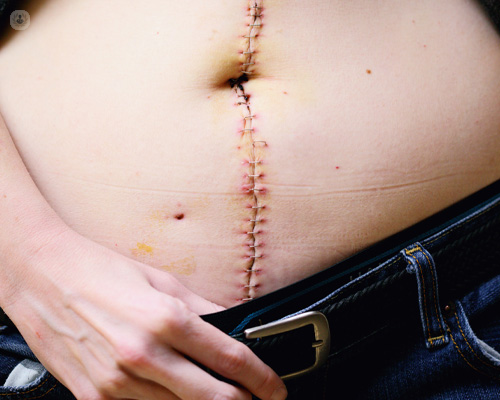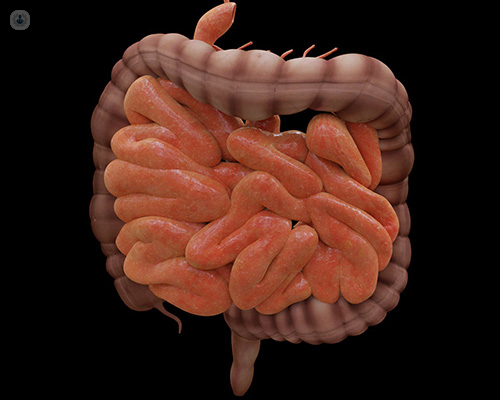Bowel cancer treatment 101
Written by:Treating bowel cancer is as uncommonly talked about as its diagnosis amongst patients, but it is just as important. Following his article about bowel cancer basics, here Mr Alexander von Roon goes into detail about what can be expected during treatment of bowel cancer.

What are the signs or symptoms of bowel cancer?
The common symptoms of bowel cancer are:
- significant change in bathroom habit (opening bowels more or less frequently than usual)
- blood or mucus in your stool
- bloating and pain before opening bowels
- a feeling of incomplete emptying of the bowels
- feeling a lump in the abdomen or back passage
- weight loss
- tiredness
- anaemia
Occasionally, there are no symptoms at all and the cancer is picked up incidentally while scanning for something else. For this reason, NHS has introduced the National Bowel Cancer Screening Programme. This programme screens all people with a stool test every two years between the ages of 60 and 74 in England and 50 to 75 in Scotland.
How is bowel cancer diagnosed?
If you have symptoms, your GP may refer you directly to a specialist or arrange a stool test called a FIT test (Faecal Immunochemical Test) and refer you to a specialist only if it is positive for blood in the stool. In this case, either a colonoscopy or a special CT scan called a CT pneumocolon will be arranged by the specialist. A CT pneumocolon is also known as a CT colonography or virtual colonoscopy, where a laxative is given and an oral contrast agent to drink the day before the CT scan and air gently insufflated into the back passage immediately before the scan.
If a bowel tumour (growth or swelling) is discovered, a biopsy is taken for two reasons. One is to confirm that it is indeed bowel cancer, and secondly is to get information about changes in the genetic makeup of the cancer cells, as these can have an impact on treatment. A tattoo may also be placed below the tumour so that it can easily be found by a surgeon performing keyhole surgery. A CT scan of the lungs, abdomen, and pelvis is also performed to assess whether the cancer has spread to other parts of the body, such as the liver or lungs. If the cancer is in the back passage (rectal cancer), an MRI scan of the pelvis is performed, as this gives more accurate information about how close the tumour is to neighbouring parts in the pelvis compared to a CT scan.
If you do not have symptoms and are diagnosed via the National Bowel Cancer Screening Programme, you will be invited to submit a stool test sample (this is done in the privacy of your own home and posted to the laboratory) every two years. If the stool test is positive for blood, you will be invited for a colonoscopy. A positive test does not mean that you automatically have bowel cancer, you could have a benign condition like a bowel polyp or inflammation of the bowel. In some parts of the country, people are invited directly to a flexible sigmoidoscopy at the age of 55 rather than be screened by stool testing. This is an abbreviated colonoscopy, where only the left side of the bowel is examined, as ca. 75 per cent of bowel cancers occur here.

How is bowel cancer usually treated?
If a bowel cancer is caught early in stages I and II, surgery alone can often be sufficient and may be curative in many cases.
Stage III bowel cancer is usually treated by surgery followed by a six-month course of chemotherapy. In some centres, selected cases are given chemotherapy for three months before surgery, and another three months of chemotherapy are given after the surgery. There is usually a deliberate four-week delay between leaving hospital after surgery and commencing chemotherapy in order to allow the wounds to heal fully.
In stage IV bowel cancer, the treatment priority is usually to control the cancer from spreading to the rest of the body, so chemotherapy is often given first. Sometimes, this is followed by surgery to remove the bowel cancer.
Rectal cancer treatment is different from colon cancer, as the anatomy of the rectum is slightly different from the bowel and the tumour is situated in the pelvis, where it is close to other vital structures such as the pelvic blood vessels, the pelvic bones and the urinary and genital systems. If the tumour appears close to other structures on the staging MRI scan, chemoradiotherapy (a combination of five weeks of daily radiotherapy and a small amount of chemotherapy given at the same time) or radiotherapy alone (also known as short course radiotherapy) are given to shrink the tumour down before surgery. A repeat MRI scan is done after this treatment to assess the amount of shrinkage and usually, surgery is performed six to twelve weeks later to allow for further shrinkage of the tumour, as it continues after the radiotherapy is stopped.
Keyhole surgery (laparoscopic surgery) is generally accepted as be the standard of care for bowel cancer, as it causes less tissue trauma, less pain, and allows a faster recovery after surgery. On average, people leave hospital one day earlier than after open surgery. In some cases, only open surgery is possible, for instance if a person has had multiple previous operations and there is scar tissue inside the abdomen or if the tumour is very large or advanced.
Most patients stay in hospital for three to five days after keyhole or robotic surgery for bowel cancer. Patients are usually prepared for surgery by being educated on what to expect in the days following the operation and then carefully guided by their consultant and a colorectal nurse specialist (CNS) during their recovery. The aim is to restore normal functioning of the body as soon as possible after the operation through early drinking, eating, and mobilisation (sitting out of the bed in a chair and walking around the ward). This approach has been shown to significantly reduce complications after colorectal cancer surgery.
If an ileostomy is made, where the end of the small bowel is brought out onto the tummy wall in the lower right abdomen and opened so that the faeces pass into a stoma bag and not into the large bowel below, the patient needs to be shown how to use it after the operation. Even though the education process starts before the operation, it can take anywhere between three and seven days to learn how to care for the stoma and for the patient to be confident that they can manage it independently at home.
If you feel you have symptoms and would like to have a consultation, you can go to Mr von Roon's Top Doctors profile and schedule a visit.



